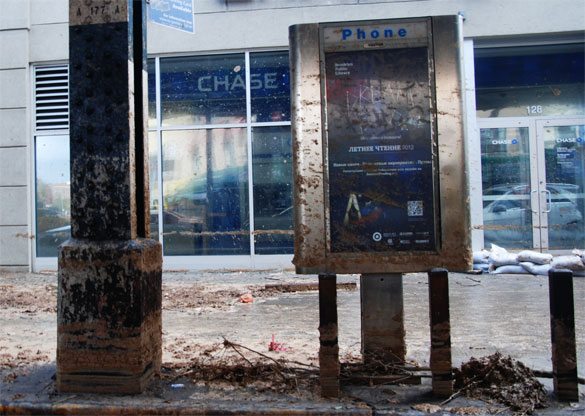Checking In On Brighton Beach’s Businesses, Post Sandy

In our mission to get out as much useful, actionable information out there about Hurricane Sandy and the recovery efforts, we haven’t had much time to check out how our neighbors in Brighton Beach are doing. So we checked in with Brighton Beach Business Improvement District Executive Directory Yelena Makhnin for an update on Tuesday.

Like the rest of us, Brighton Beach is plodding forward with recovery efforts, and, though Brighton Beach Avenue’s businesses were under as much as five feet of mud and water, some are getting back up to speed.
“Each and every store got some portion of damage. A lot of water. I don’t even know of one business without losses,” Makhnin said.
Still, about 40 percent of the businesses have opened up, and others are offering limited service.
Power remains an issue. Huge swaths of Brighton Beach – including chunks of Brighton Beach Avenue – remain without electricity. And though some sections were hardly touched – such as the stretch between Brighton 5th Street and Brighton 6th Street, where storefronts have no basements to worry about – the lack of power has crippled businesses that could otherwise be up and running.
“Half of the block does not have power,” Makhnin said. “The side of the block close to Brighton Beach is functioning very well. The restaurant is open, the cell phone store is open. The other side is dark.”
FEMA isn’t offering much relief for small businesses either, Makhnin said, which is also hurting business’ ability to bounce back. For starters, unlike residences, FEMA does not offer disbursements for claims on losses for businesses. They only offer loans.
“Loan is not a good word. I’m not comparing business homeowners with individuals like property owners, but property owners can claim something and get money. Businesses can’t. Loan is not a good word,” she said.
Complicating matters further, is that FEMA and others require documentation from private insurers. But the insurance companies appear overwhelmed, and are not returning phone calls.
“About 50 to 60 percent of the businesses here, as of today, were not able to reach their insurance brokers,” Makhnin estimated.
But her organization, the Brighton Business Improvement District, is doing its part. Their offices, inside the Chase bank at Brighton Beach Avenue and Coney Island Avenue, flooded, and the bank had not given the BID access as of Tuesday when we spoke. Makhnin has been running between visiting businesses, volunteering at the Shorefront Y, and heading to the headquarters of Davidzon Radio, where she has set up an impromptu office using their computers and phone lines.
There, she’s been able to alleviate some of the problems, like garbage.
“It’s still a lot of garbage in Brighton,” she said.
Following the storm, the dozens of grocery stores and restaurants lining Brighton Beach Avenue put their food waste out on the curb.
“The reason we were trying to get rid of it as soon as possible is because it’s a lot of food from food stores in those bags and it’s a health hazard,” Makhnin said. “We have enough rats and mice in Brighton and it’s a problem and we don’t want more, and we don’t want businesses to pay for it later by having the Health Department close their businesses down.”
But the city’s Sanitation Department, hobbled by their mandate to clear out trash from Sandy-damaged neighborhoods, could not respond quick enough. So the BID hired their private carting company to remove rotting foodstuffs from the street.
Makhnin said 90 percent of the trash and debris was gone as of Tuesday, and the mayor’s office has promised her a quick response in removing the rest.
The district, and its residents, have also been getting a lot of help from those outside of New York City, coordinated in part by the BID, the Shorefront Y, and various government and non-profit agencies.
“These kinds of situations show us the best and the worst side of people. The phone calls I’m getting, from people outside of New York City … God bless everybody, that’s all I can say,” she said, adding that a pastor from a church in upstate New York, and residents of Chicago’s Russian neighborhoods, have sent truckloads of supplies.
“I know for sure we’re going to be back to business, all of us, and we’re going to be even better,” Makhnin said.



